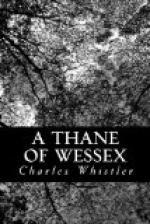“Trapped they are, Sheriff,” said Ealhstan, when Osric rode up to him, bearing still a headless spear. “Let them bide till Eanulf comes. None can reach the ships.”
“He is hard behind me with all the levy,” said Osric. “Let us finish this without him.”
But Ealhstan shook his head, pointing to our men. And when he looked more coolly, he saw that barely half of us were left, and those worn out. So must we stand and wait; but we had done what we went to do, and had trapped the heathen when the tide was low. Yet the Danes went steadily back towards their ships, having yet half a mile to cover, but they left a line of wounded men to mark where they had gone, as one after another dropped.
Now were we who were left safe, and knew we had done a deed which would he told and sung till other tales of victory blotted out its remembrance if they might.
Then Ealhstan bade us sit down, for our horsemen were between us and the foe, and thereon he raised his voice, and with one accord his lay brethren and his own housecarles joined in singing a psalm of victory. And it was just at the matin time—yet that psalm ended not as it was wont, for ere the last verses were sung, it was drowned in a great and thundering war song of Wessex, old as the days of Ceawlin or beyond him. And if I mistake not, in that song bishop and lay brethren joined, leaving the chant for their own native and well-loved tongue, else would they have been the only men of all the host unstirred thereby and silent.
Now, from that war song came a strange thing. It caused two great Danes to go berserk in their rage, and back they flew on us, their shields cast aside, and their broad axes overhead, howling and foaming as they came.
One of Osric’s men tried to stop them. But he and his horse fell, for (I say truth) one leapt high above the horse, smiting downwards with his axe, so that the man was swept in twain under that blow, and the berserk Dane came on unhindered, straight for the standard, for his comrade had hewed off the horse’s head.
Now I rested, by the standard, a long spear’s length in front of our line. But by this I had leapt to my feet; and it was time, for he was almost on me. Spear had I none; so I dragged out the standard shaft from the ground where I had struck it, and levelled that sharp butt end full at his chest. Overhead was his axe again, and I had no shield to stop the blow; but I must leap aside from it.
He paid no heed to the spear-ended shaft, but rushed straight on it, spitting himself through and through, while his axe fell; but I had wrenched myself and the shaft at once to one side, and he fell over, burying the axe head in the ground but an inch from the collier’s foot. Yet had he not done with me, for, leaving the axe, he clawed the ashen shaft and dragged himself up along it, howling, not with the pain, but with madness, and I must needs smite him with my sword, for his dagger was already at my throat.




